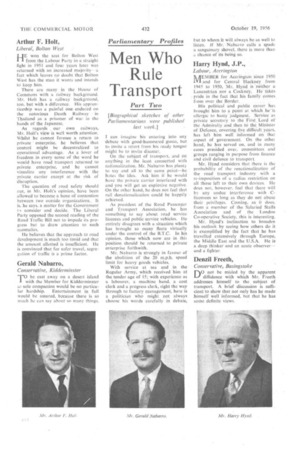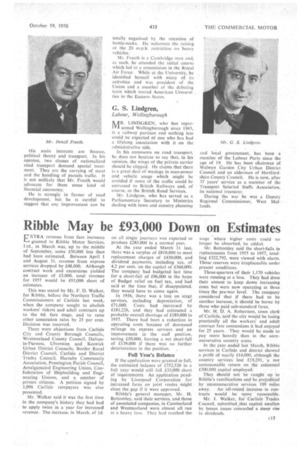Men Who Rule Transport
Page 52

Page 53

If you've noticed an error in this article please click here to report it so we can fix it.
Part Two Arthur F. Holt,
Liberal, Bolton West HE won the seat for Bolton West from the Labour Party in a. straight fight in 1951 and four years later was returned with an increased majority--a fact which leaves no doubt that Bolton West has the man it wants and intends to keep him.
There are many in the House of Commons with a railway background, Mr. Holt has a railway background, too, but with a difference. His apprenticeship was a painful One endured on the notorious Death Railway in Thailand as a prisoner of war in the hands of the Japanese.
As regards our own railways, Mr. Holt's view is well worth attention. Whilst he cannot foresee a return to private ' enterprise, he believes that control might be decentralized to operational advantage. As a lover of freedom in every sense of the word he would have road transport returned to private enterprise, and he cannot visualize any interference with the private carrier except at the risk of disruption.
The question of road safety should not, in Mr. Molt's opinion, have been allowed to become a bone of contention between two outside organizations. It is, he says, a matter for the Government I.) consider and decide. The Liberal Party opposed the second reading of the Road Traffic Bill not to impede its progress but to draw attention to such anomalies, He believes that the approach to road development is much too timid and that the amount allotted is insufficient. He is convinced that for safer travel, segregation of traffic is a prime factor.
Gerald Nabarro,
Conservative, Kidderminster TO be cast away on a desert island with the Member for Kidderminster a:z sole companion would be no particu
lar hardship. Entertainment in full would be assured, because there is so much he can say about so many things. can imagine his entering into any 'debate with good-huinoured gusto, but to invite a retort from his ready tongue might be to invite disaster.
On the subject of transport, and on anything in the least connected with nationalization, Mr. Nabarro has plenty to say and all to the same point—he lutes the idea. Ask him if he would have the private carrier interfered with and you will get an explosive negative. -On the other hand, he does not feel that rail denationalization could be happily achieved.
As president of the Road Passenger and Transport Association, he has something to say about road service licences and public service vehicles. He entirely disagrees with a situation which has brought so many fleets virtually under the control of the B.T.C. In his opinion, those which now are in this position should be returned to private enterprise forthwith.
Mr. Nabarro is strongly in favour of the abolition of the 20 m.p.h. speed limit for heavy goods vehicles.
With service at sea and in the Regular Army, which received him at the tender age of 15; with experience as a labourer, a machine hand, a cost clerk and a progress clerk, right the way through to factory management, here is a politician who might not always choose his words carefully in debate,
but to whom it will always be as well to listen. If Mr. Nabarro calls a spade a sanguinary shovel, there is more than a chance of its being so.
Harry Hynd, J.P.,
Labour, Accrington olEmBER for Accrington Since 1950 IV-L and for Central Hackney from 1945 to 1950, 'Mr. liynd is neither a Lancastrian .nor a Cockney. He takes pride in the fact that his family cot us
from over the Border. . His political and public career has brought him to a Point at which he'is allergic to hasty judgment. Service as private secretary to the First Lord of the Admiralty and then td the Minister of Defence, covering five difficult years. has left him well informed on that aspect of government. On the othei hand, he has served on, and in many cases presided over, committees and groups ranging in purpose from finance and civil defence to transport.
Mr. Hynd considers that there is the probability of the renationalization of the road transport industry with are-imposition of a radius restriction on all those left to their own devices. He does not, however, feel that there will be any undue interference with Clicensees so long as they do not abuse their privileges. Coming, as it does. from a member of the Salaried Staffs Association and of the London Co-operative Society, this is interesting.
Mr. Hynd's inclination to broaden his outlook by seeing bow others do it is exemplified bY the fact that he has travelled extensively through Europe, the Middle East and the U.S.A. He is a deep thinker and an acute observer-and a fighter
Denzil Freeth,
Conservative, Basingstoke DO not be misled by the apparent diffidence with which Mr. freeth addresses himself to the subject of transport. A brief discussion is sufficient to show that not only has he made himself well informed, but that he has some definite views. His main interests are finance, political theory and transport. In his opinion, two classes of nationalized road transport demand special treatment. They are the carrying of meat and the handling of parcels traffic. It is not unlikely that Mr. Freeth would advocate for them some kind of financial autonomy.
He is strongly in favour of road development, but he is careful to suggest that any improvement can be totally negatived by the retention of bottle-necks. Ile welcomes the raising at the 20 m.p.h. restriction on heavy vehicles.. .
Mr. Freeth is a Cambridge man and, as such, he attended• the initial course which led to a commission in the Royal Air Force. While at the University, he identified himself with many of its activities and was president of the Union and a member of the debating team which toured American Universities in the Eastern States.
G. S. Lindgren,
Labour, Wellingborough
R. LINDGREN, who has repre sented Wellingborough since 1945, is a railway partisan and nothing less could be expected of one who has bad a lifelong association with it on the administrative side.
In his comments on road transport. he does not hesitate to say that, in his opinion, the wings of the private carrier should bc clipped. He claims that there is a great deal of wastage in man-power and vehicle usage which might be avoided if more of the traffic could be entrusted to British Railways and, of course, to the British Road Services.
Mr. Lindgren, who has served as a Parliamentary Secretary to Ministries dealing with town and country planning and local government, has been a member of the Labour Party since the age of 19. He has been chairman of Welwyn Garden City Urban District Council and an alderman of Hertfordshire County Council. He is now, after 37 years' service as a member of the Transport Salaried Staffs Association, its national treasurer.
During the war he was a Deputy Regional Commissioner, West Midlands.












































































































